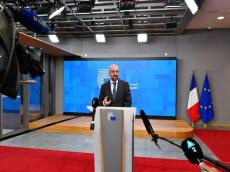Today.Az » Politics » Post-Brussels meeting abstractions: What lay in store?
24 May 2022 [14:22] - Today.Az

By Azernews
By Orkhan Amashov Not as ground-breaking as the 6 April summit, the third trilateral meeting between Azerbaijani President Ilham Aliyev and Armenian Prime Minister Nikol Pashinyan through the mediation of European Council President Charles Michel, was undeniably a success. It exceeded the bare minimum by addressing some specifics on connectivity and other areas, and strengthened the weakened momentum of the peace negotiations. As anticipated by many, including the author of the present submission, no final document was adopted, which is relatively unimportant within the grand scheme. Instead, we have Charles Michel's clearly compartmentalised post-meeting statement which clearly delineated the subjects discussed within five hours, lightening the task on the shoulders of a discerning observer encumbered with the task to reflect. None of the points in Armenia's six-point package that were inadmissible to Azerbaijan made it to the post-meeting statement of the EU President, whereas Baku's five-point plan was fully reflected therein. This moment alone was sufficient to ascertain as to which side is primed to pull the strings. The Brussels format, as with the Kremlin-mediated variant, views post-conflict normalisation within an interstate format, which suits Baku’s interests, treating the fate of Karabakh Armenians as secondary to the main agenda. Michel‘s statement referred to the rights and security of the Armenian population of Karabakh without any allusion to any aspects that would have perturbed Azerbaijan. On the whole, two sets of subjects loomed large in the post-meeting statement. These were border issues and connectivity. On 6 April, the sides agreed that, by the end of the month, the border commissions should convene, yet no meeting had taken place prior to the 22 May convocation. In some ways, the EU has brought matters back to square one, somewhat resetting the joint work on border delimitation and demarcation. The results were immediately implemented after the meeting, as both sides confirmed that the border commissions have been established and will meet in the very near future. In fact, some sources suggest the first meeting on the state border could take place as early as 24 May. Although it is abundantly clear the commissions are tasked with working on delimitation and demarcation issues, Yerevan has been inclined to envision them as watchdogs reporting on border security. This now seems to have changed. Connectivity, a subject in relation to which the EU sets great store, has been given a core share. The novelty here is that the sides have agreed on the principles governing border administration, security, land fees and customs in the context of international transport. Although it is currently unclear as to what those agreements are, the principle concurrence, at this stage, seems to be sufficient to amount to tangible progress. Michel’s statement does not mention the Zangazur Corridor as a term, but refers, inter alia, to the transit between “Western Azerbaijan and Nakhchivan” and “between different parts of Armenia via Azerbaijan”. The unblocking of communications is integral to Europe’s vision of the future of the South Caucasus, as the more interconnected the region, the profounder the EU’s influential ability will become. The Economic Advisory Group, referred to in the statement, is a complimentary element aimed at envisioning economic development and sustainable growth, and fits nicely with the whole connectivity project. One aspect which is undoubtedly the case is that the EU has reinforced its chief mediation role to the extent of measurably outweighing the Moscow format. The crisis in Ukraine and the Kremlin's preoccupation with its western neighbour have allowed Brussels to wield an influence that, at this juncture, seems more consequential on the way to a prospective peace treaty. Having said that, the Kremlin-mediated platform has not entered into the soft iridescence of disembodiment yet, in fact, it would be very naive and ill-thought to relegate Moscow to second grade. Even whilst enmeshed in the war in Ukraine, Russia has sufficient resources to divert its attention to the South Caucasus with regular consistency. At the end, without falling into the unforgivable trap of beating around the bush, the overall conclusion seems to be that the result is neither excessively brilliant, nor ground-breaking, but sufficiently satisfactory and above the minimum expectation, and is thus deserving of a reserved approbation. Circumstances may be said to be moving in the right direction, but Azerbaijan is rowing a boat against a stream engendered by Armenia's obduracy.
|